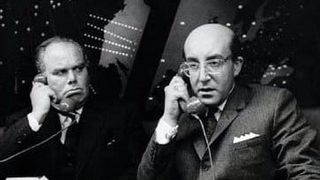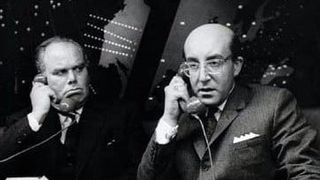The brilliant film director Stanley Kubrick captured on celluloid the absurdities of the first Cold War. Dr Strangelove or: How I Learned to Stop Worrying and Love the Bomb is a wickedly funny cinematic account of how easily the world might have slipped into a nuclear confrontation between the US and the Soviet Union in the early 1960s.
The mentally unstable strategic air commander, General Jack D. Ripper (the magnificent Sterling Hayden), unilaterally sends his wing of B52s off to bomb the Soviet Union.

Having done this, Ripper dispatches a message to US president Merkin Muffley (the unforgettable Peter Sellers), in which he boasts, “My boys will give you the best kind of start, 1400 megatons worth … God willing, we will prevail, in peace and freedom from fear, and in true health, through the purity and essence of our natural fluids.”
In the war room in Washington DC, Muffley replies to the effect that Ripper is obviously a psychotic, to which General Buck Turgidson (the inestimable George C. Scott) interjects that he would like to wait until all the evidence is in.
Satire works best when there is a clear connection to reality. The truly terrifying element of Dr Strangelove is that it demonstrated that it was very possible to sleepwalk into a nuclear holocaust. The Cuban missile crisis of October 1962 still represents exhibit 1.
Satire works best when there is a clear connection to reality. The truly terrifying element of Dr Strangelove is that it demonstrated that it was very possible to sleepwalk into a nuclear holocaust. The Cuban missile crisis of October 1962 still represents exhibit 1.
Now Honiara 2022 is not Havana 1962. Not yet. But if ignored, that’s exactly what the nations of the South Pacific, including Australia, would be confronting.
Former Australian Secret Intelligence Service boss Nick Warner underlines the sleepwalking in Australian foreign policymaking that has led to the looming Chinese military presence in Solomon Islands, while consequences of being asleep at the diplomatic wheelhouse have been demonstrated most convincingly by Australian historian Christopher Clark in The Sleepwalkers, detailing events leading to World War I.
There are parallels with Cuba. Beijing has overreached itself strategically, just as Nikita Khrushchev managed to achieve in 1962. But to date the dissimilarities outweigh the parallels. However, it is no accident the Chinese Communist Party has focused on the strategically significant Solomons, courtesy of a venal island government that has echoed the disinformation of the Global Times and issued invasion alerts.
The first requirement for Australia is to discard the P-word panic and embrace the P-word perseverance. Australian foreign policy can recover from this setback provided we attempt to listen and respond more carefully and conscientiously to the Pacific Island nations. Issues in focus are as diverse as climate pressures, through to labour initiatives embracing the concept and reality of guest workers from the Pacific.
Australian policy has been too slow through the years. The recent Labor initiative of increased training for Pacific Island security forces, however, is a good first step. While being focused on policy in concert with our allies and partners, the US, Japan and New Zealand, there also needs to be a recognition of the significance of France as a Pacific power. This may be galling for some, but French co-operation and support in the region can yield much at the simple price of Australian humility.
Finally, the “red line” in the region on Chinese militarisation must be clear beyond doubt.
Kurt M. Campbell, Washington’s National Security Council co-ordinator for the Indo-Pacific, came very close, but let us remember president John F. Kennedy’s declaratory statement during the Cuban missile crisis of October 1962. While pursuing the objective of a peaceful resolution through multilateralism, including the UN and the Organisation of American States, Kennedy made it clear to the aggressor and to the world: “It shall be the policy of this nation to regard any nuclear missile launched from Cuba against any nation in the western hemisphere as an attack by the Soviet Union on the United States.” The line was indelibly drawn.
There needs to be significant diplomatic architecture erected to guarantee the security and sovereignty of the South Pacific. Australia should take a leading role, in concert with our allies and partners, but making certain that our neighbourhood not only agrees but also endorses the agenda for co-operation.
However, like the Boston Democrat he always was, JFK maintained a backchannel to Moscow through his brother Bobby, the US attorney-general, who could speak discreetly to the Soviet ambassador, Anatoly Dobrynin.
Canberra maintains that Beijing’s military initiative in the Solomons is timed to coincide with our election and is an attempt to influence its outcome. The security agreement with the Solomons is a demonstration by Beijing of its reply to AUKUS. Ironically, the CCP has alarmed the “AUKUS caucus” in the US congress, which is now focused rigorously on security in the Solomons, recalling the Battle of Guadalcanal in 1942.
The West has been in a second cold war ever since Russian dictator Vladimir Putin seized the Crimea. As with all dictators, this was no satisfaction for him, and the war in Ukraine, and possibly Moldova, has been the consequence. Democracies have rallied around the world and the dictators have been obliged to take notice.
There needs to be significant diplomatic architecture erected to guarantee the security and sovereignty of the South Pacific. Australia should take a leading role, in concert with our allies and partners, but making certain that our neighbourhood not only agrees but also endorses the agenda for co-operation.
Australia has much to offer the South Pacific, and through the dimensions of education, economy, transport and communications, culture and sport we should be opening the doors wide to our neighbours. Why not an 18th NRL team from Papua New Guinea?
We need not yet contemplate a multinational naval blockade in the South Pacific, on the model of the US Navy off the shores of Cuba. The truth is, in 1962 the world did not have to turn to Dr Strangelove’s “mineshaft gap” to survive. But Australia should see opportunity accompanying responsibility in the South Pacific given the arrival of a potentially hostile military power in Honiara.




